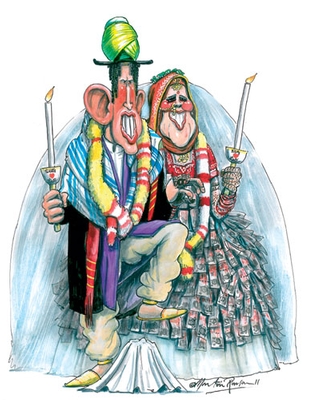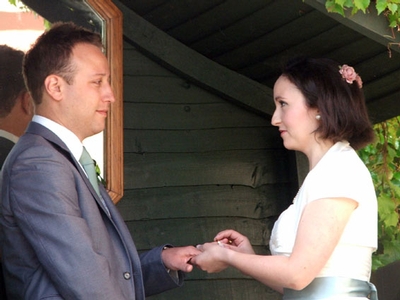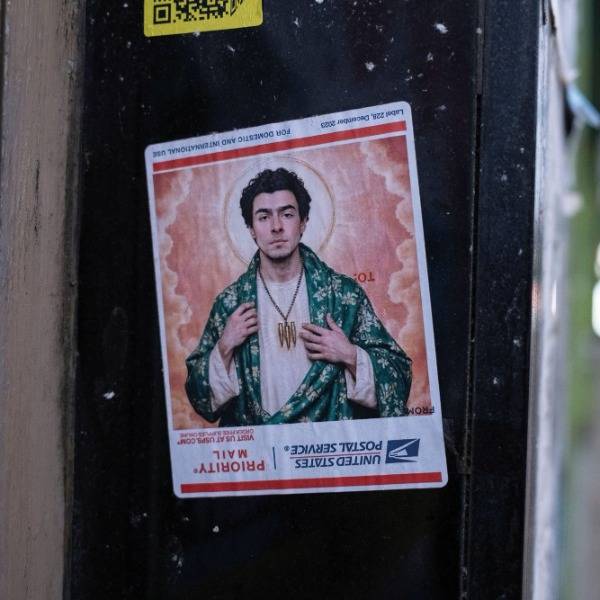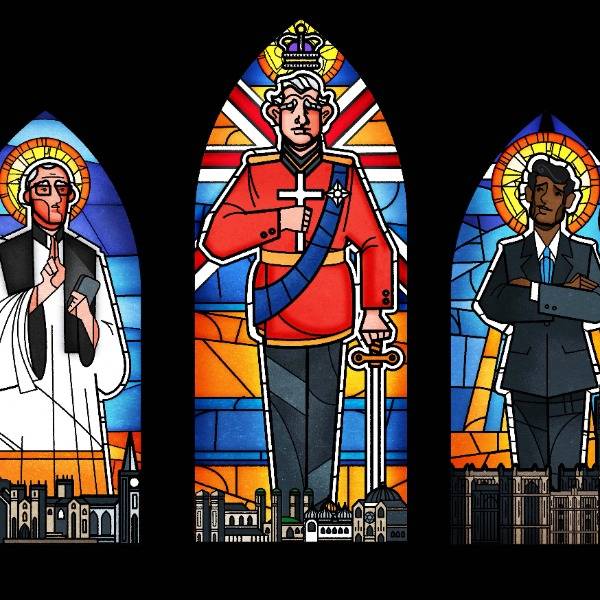
To begin with, we had the Royal Wedding Sick Bag, available in letterbox scarlet, royal blue and gold (limited edition). This was followed by – to graze just the very tip of the iceberg – a book of irreverent lookalike photographs by Alison Jackson called Kate and Wills up the Aisle, and a report on thespoof.com that the happy couple intend to tie the knot wearing “full nuclear radiation protection” as a gesture of solidarity with the Japanese. And it’s even rumoured that the Little Britain team is planning to stage an alternative ceremony, with Matt Lucas playing Kate Middleton.
But no spoof piqued global interest quite as much as the Jewish Chronicle’s deadpan story which ran on the festival of Purim (where Jews get drunk to commemorate the execution of a malevolent Persian minister, four hundred years before Christ). Kate and Wills, the Chronicle reported, are planning to acknowledge “the multi-cultural nature of modern British society” in their nuptials. While the ceremony will be “completely Anglican in nature,” the happy couple will smear “mehendi” paste on each other in accordance with Muslim tradition, then, following Hindu custom, offer each other a “morsel of food”. Finally, the Chronicle quipped, the prince will “smash a glass with his foot” in a nod to the Jewish tradition.
The response to this nugget of foolishness was extraordinary. News outlets all around the world took it seriously, including Israel’s leading broadsheet, Ha’aretz (who, red-faced, have since removed the report from their website). Meanwhile, the Twitterverse took the ball and ran with it. Wiccans demanded a human sacrifice in Trafalgar Square; Jedis suggested that Charles lop off Wills’ hand with a light sabre; and Pastafarians – devotees of Dawkins’s Flying Spaghetti Monster – began lobbying for a “traditional” pasta-based feast.
All great fun, of course, but for my wife and me the Jewish Chronicle touched a nerve. The Royal Wedding will take place almost on top of our own first wedding anniversary – bringing back memories of the angst we faced when planning it. We weren’t worried about the food, the band or the flowers. Our dilemma was more existential than that. It was this: as non-religious, 21st-century, multiple-heritage Brits, what sort of ceremony should we have?
In essence, there are only two options – a religious ceremony or a civil one. For Wills and Kate, this was a foregone conclusion. Anglican ceremony, Westminster Abbey. Nothing could be simpler. But for the rest of us? Getting married in a religious place when you’re not religious is obviously disingenuous. But does anyone – has anyone, will anyone ever – actually find the civil ceremony inspiring?
I come from a large family, which contains religions of many different stripes. In addition to the obligatory Christians and one or two Buddhists, my kin includes a small cohort of Orthodox Jews. My wife, on the other hand, is from a small family. She was brought up in a home where God has been dethroned, and replaced by literature and the arts. Oh, and we’re both half Jewish.
So our guest list featured a range of religious believers, many of whom held their views with passion. It also included many atheists and agnostics, as well as devotees of the arts, and those who had never taken the question of God’s existence seriously enough to come up with a position on it. In fact, in terms of the religious variety of the guest list, our wedding was pretty representative of the majority of weddings in the UK; it was probably also quite similar to the Royal Wedding guest list.
The presence of committed religious people at our wedding underscored just how ridiculous it would have been for my fiancée and me, as unbelievers, to get married in a church or a synagogue. Which gave me a profound, unexpected frisson of loss. For centuries, the rituals that formed the cornerstones of our ancestors’ lives have been dominated by religion. They were born, lived their lives and died within a network of religious ceremony and symbolism, which nobody ever thought to question and which bound the community together.
Although we’d never wish to trade our moral honesty for their moral certainty, we both wanted to have a wedding that felt rooted within an ancient tradition. It seemed to me that no matter how excellent a wordsmith you are, writing your own ceremony – within the narrow limits allowed by law – could never evoke the gravity and power of the traditional texts. “For better or worse, for richer for poorer, in sickness and in health”: the words are sublimely elegant and moving, but their power comes from something greater than that.
For generation after generation, lovers have used them to articulate their deepest feelings, and to frame the most solemn promise of their lives. You can feel it. Just because my fiancée and I didn’t want to be part of a religion, why should that exclude us from our own cultural heritage?
It could be argued that if we felt that strongly about it, we should feign a religious affiliation, have a Christian – or Jewish – wedding and be done with it. After all, many people listen to church music (another cultural inheritance) without believing that Jesus was born of the Flying Spaghetti Monster. But the parallel is not direct. When making a solemn promise that will bind you to another person for ever, to do so before a symbol whose authority you do not recognise can only make the vows stick in your throat.
A civil ceremony, however, was not an attractive option. Quite frankly, it seemed composed of a blend of legalese and platitudes (“Jake and Isobel wish to marry each other, for in each other’s company they have found fulfillment and love. As a consequence of this love they have drawn closer together and now wish to affirm publicly their relationship . . .” Bleurgh). To make matters worse, the rules offered little room for manoeuvre. We couldn’t get married outdoors; there was a “bring your own CDs” policy, but there were strict guidelines on time, place and wording. Moreover, whichever Registrar happened to be on duty would be the person to marry us. On a day when we were obsessively planning every last detail, why would we want to leave something like that to chance?
It was as we were wrestling with this cultural Rubik’s Cube that we discovered the option of a humanist wedding. (Don’t stop reading: this is no advertorial.) A website introduced the idea thus: “Elements of a traditional church wedding can still be very attractive to couples without strong religious connections. A register office wedding can, meanwhile, seem uninspiring and austere.” Talk about nails and heads. We contacted the British Humanist Association immediately, requesting more information (quaintly, this is only available by post).

But the off-putting literature finally offered us our solution. Humanist weddings are not legally binding in England (they are in Scotland). This means that they need to be backed up by a ceremony at a Register Office. If this was the case, we reasoned, why did we have to align our ceremony to any body of authority at all? Why couldn’t we get legally married at a Register Office, then set up a main wedding ceremony in which we simply did our own thing? If it wasn’t legally binding, what would anyone care? It wouldn’t mean anything to the state; but it would mean everything to us.
And so, last summer – following a low-key, legal procedure at the Register Office – we got married properly in my grandparents’ lovely garden in Winchester. The ceremony was led by my uncle, who is close to both my wife and myself. We took the Church of England ceremony and stripped out references to God, in the same way as one would strip out varicose veins; this was surprisingly easy to do. We added some readings and a few lines related to our children (we have three). The result was a perfect blend of the ancient and the modern. Symbolically enough, the blue sky behind us was penetrated by the steeple of my grandparents’ local 16th-century church. The blend was perfect. Religion was in sight, lending us the weight of its cultural inheritance. But it was no longer dictating the terms. n
The British Humanist Association inform us that they are currently revamping their wedding literature, and their humanist celebrants are only too happy to devise ceremonies to suit every taste and audience www.humanism.org.uk/ceremonies

